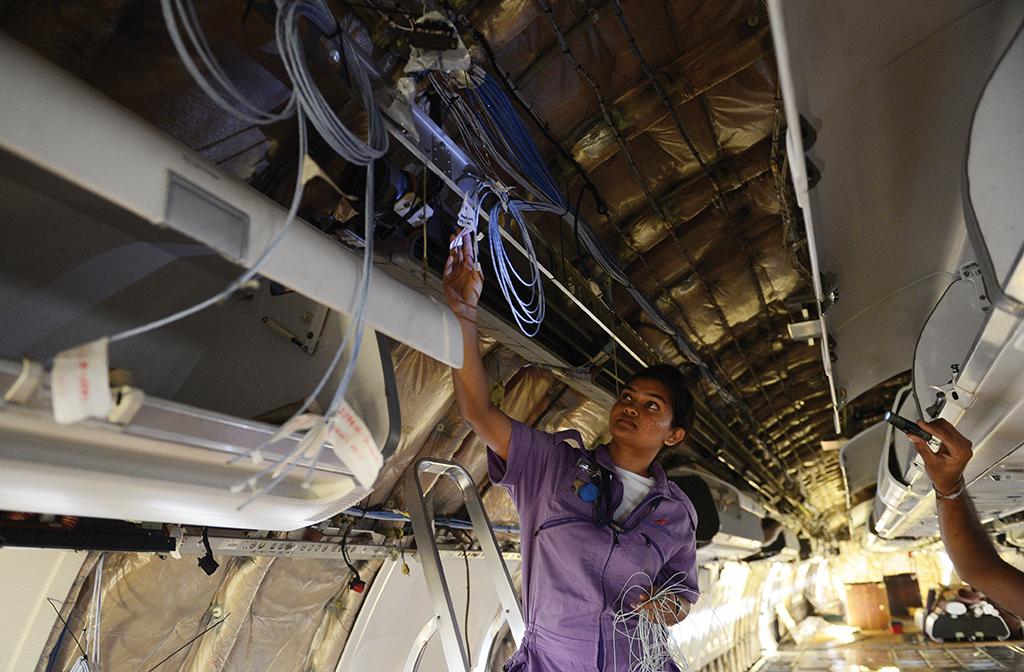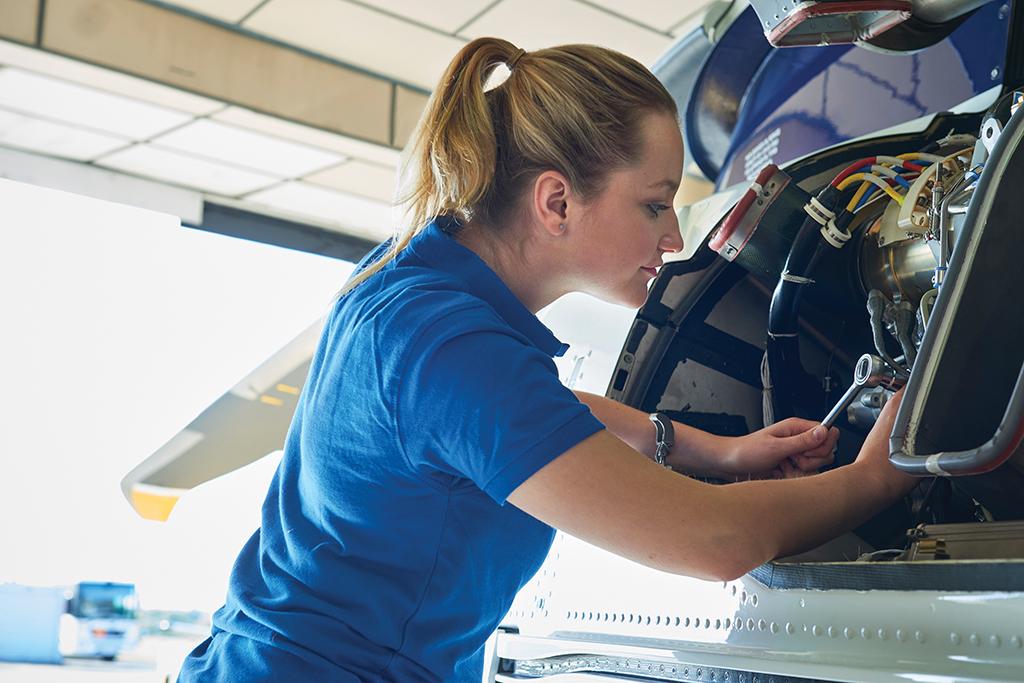
Since the first woman obtained her aircraft mechanic’s license nearly a century ago (Phoebe Omlie in 1927), the number of women in the MRO workforce has grown slowly. Although it is no longer an oddity to see a woman as part of a maintenance crew, their representation in the workforce remains relatively small.
According to the FAA’s most recently released aviation workforce data, U.S. Civil Airmen Statistics for 2019, women still make up less than 3% of the certificated workforce in MRO-related jobs such as mechanic, repairman (a term which, in and of itself, seems antiquated) or flight engineer. Despite steps in the right direction, the aviation industry still has a long way to go in reaching gender parity, and women in the workforce still report challenges in being treated fairly and with respect on the job.
During a panel at the Women in Aviation (WAI) 2021 Virtual Conference on March 12, a group of female technicians with decades of experience working in commercial, corporate and military MRO shared their experiences of challenges on the job due to their gender. In addition to receiving inappropriate stares at their body parts or disparaging remarks from coworkers—such as being called “a little girl” or a “heifer”—each of the women reported experiences in which they faced discrimination or harassment.
Lynette Ashland, an aviation maintenance instructor and board member of the Association for Women in Aviation Maintenance (AWAM), says the challenges began as early as airframe and powerplant (A&P) school. Ashland was the only woman in her class alongside 13 men, and although things started well and she was holding her own against her peers, a male instructor in her second semester made it clear that she was unwelcome.

“He was trying to weed me out. He did not feel that a female should be a technician,” says Ashland. “The instructor had been leading the charge to have the guys sabotage my work, play jokes on me and do other things.”
Ashland detailed one incident, during which she and her classmates were asked to carry out various maintenance tasks on a business jet. Ashland was assigned the task of removing the aircraft’s wheels and tires, inspecting them and putting everything back together. After removing the wheels and tires, Ashland’s group was told to go on a break. When she returned, the wheels and tires she had removed were missing and the instructor insisted that she go search for them despite her insistence that she had not misplaced them. Eventually, the head of the school became involved and forced Ashland to leave the building for 10 min. When she returned, the wheels and tires were mysteriously back in their place.
Cindy Rodina, an instructor of aviation maintenance at a Part 147 school and an AWAM board member, also reported an uncomfortable situation from her A&P training. During a unit on sheet metal riveting, one male instructor singled her out and asked her to stay after school so he could blindfold her, saying he wanted her to be able to perform riveting and “know when it was bucked by the sound.”
Prior to starting a job as the first woman on a maintenance crew, Rodina noted that a supervisor held a meeting with the all-male team and told them they had to take pictures of women off their lockers, stop using profanity and be on their best behavior because she was coming to the shop. “Before I even got there, I was not very welcome,” said Rodina. “It took me a while just to get past that to where the guys weren’t just snickering at me and trying to be vulgar on purpose just to see my reaction.”
While common sense would dictate that a woman should report incidents like this to human resources staff, Rodina noted that in the earlier days of her career, HR departments did not always exist, so women had to either handle situations on their own or ignore them. “You kind of had to weigh, ‘Is it worth doing anything about?’ because it could make your life even worse,” she added. “Any disciplinary action towards a man can cause a lot of animosity towards the woman.”
Even if a woman does report an incident to HR, the panelists noted that there could be negative consequences for their career. One panelist spoke about her experience with a malesupervisor in the military who continued to pursue unwanted touching. When she finally reported him, she was placed on a different, less desirable shift. Meanwhile, the supervisor in question faced no consequences and was later promoted.
Rodina described a similar situation in which a male coworker repeatedly left notes in her locker, which escalated to the point that she became frightened. When she reported the situation to HR, Rodina says their concern was more focused on whether her husband, who worked at the same company, would have a negative reaction than on her colleague’s inappropriate behavior. Ultimately, Rodina says HR dealt with the situation by changing her shift.
“For every little instance where you could take something to HR, you have to look at what it does to your reputation,” Ashland noted.
Although most of the negative experiences discussed during the panel pertained to how female technicians were treated by male colleagues, Ashland pointed out that discrimination can also come from other women in the industry. In one incident when she was a relatively new technician, Ashland said a flight crew refused to believe she was an actual maintenance technician assigned to meet an incoming aircraft that had reported issues.
“You have to stop and realize that not always is every woman that you come across in the job going to be there to be your supporter,” says Ashland. “You kind of have to take a bit of a guarded stance against everyone you have to work with.”
Rodina points out that the atmosphere in the hangar can often skew toward being a “good ole boys’ club,” so the mentality needs to change from within. “I came to realize that being in the field was a threat to some of the men. Like, ‘What kind of man can I be when a woman can do my job?’” she says. “I don’t know if we can ever breach the macho barrier. The good guys have to almost shame the bad guys to stop their behavior.”
Rodina and Ashland both noted that it is important for female technicians to develop a support system at work. “You have to find people who are going to be your allies and your mentors. Some of the best mentors and allies I’ve had throughout the industry in the nearly 30 years I’ve been doing this have been a couple of the guys,” says Ashland. “Whether it’s the support you get going through A&P school, the support you get on the job, the young guy that’s going to become your pal and who’s going to have your back always, or the old guy to take you under his wing because you’re the daughter figure to him—it doesn’t matter—but you’ve got to find those allies.”
Another key element in creating equity, says Rodina, is for companies to ensure they have proper facilities and personal protective equipment for women. “When I was in the hangar, it was a fight just to get small-sized gloves for myself,” she says. In another instance, Rodina once ended up doused in hydraulic fluid—which burns the skin—and there were no women’s shower facilities or locker rooms on-site, so she finished the job and told the foreman she was leaving for the day. The foreman insisted that she should just take a shower in the men’s facilities while someone stood guard. Ultimately, Rodina says she had to take personal time and leave without pay.
Rodina also suggests that MROs could recruit more women by providing childcare on premises or help with childcare so it is easier to make the jobs work with their schedule. While she says this is often perceived by men as special treatment, she points out that there are also single dads in the workforce, so having help with childcare would ultimately benefit everyone.





